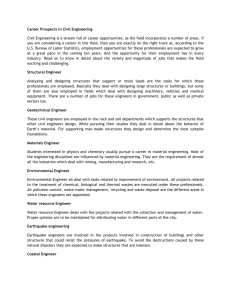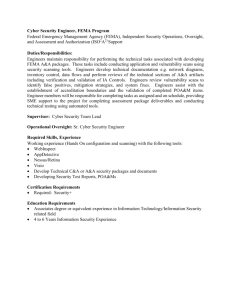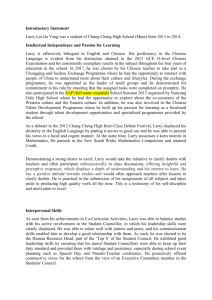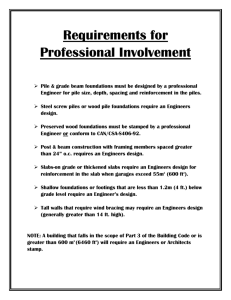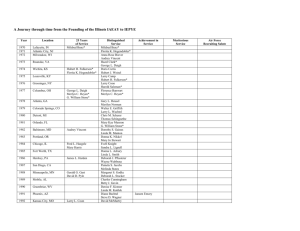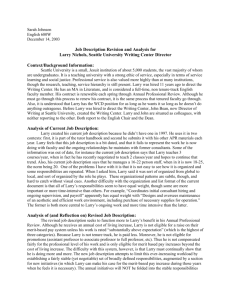COONSprofile - University of Colorado Boulder
advertisement
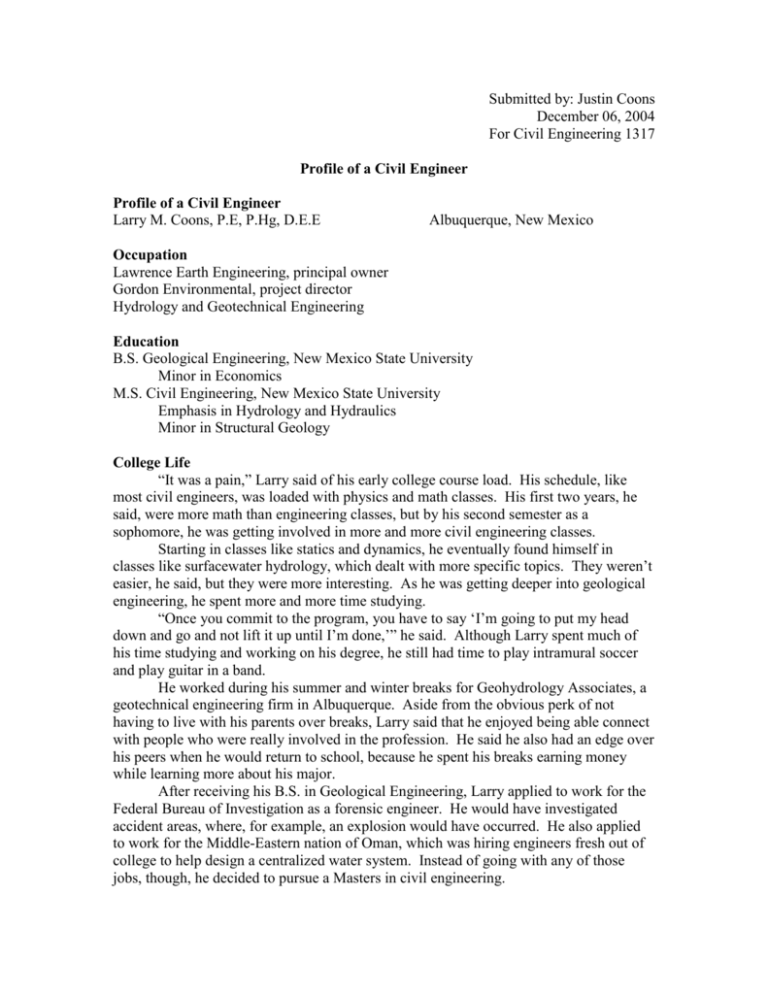
Submitted by: Justin Coons December 06, 2004 For Civil Engineering 1317 Profile of a Civil Engineer Profile of a Civil Engineer Larry M. Coons, P.E, P.Hg, D.E.E Albuquerque, New Mexico Occupation Lawrence Earth Engineering, principal owner Gordon Environmental, project director Hydrology and Geotechnical Engineering Education B.S. Geological Engineering, New Mexico State University Minor in Economics M.S. Civil Engineering, New Mexico State University Emphasis in Hydrology and Hydraulics Minor in Structural Geology College Life “It was a pain,” Larry said of his early college course load. His schedule, like most civil engineers, was loaded with physics and math classes. His first two years, he said, were more math than engineering classes, but by his second semester as a sophomore, he was getting involved in more and more civil engineering classes. Starting in classes like statics and dynamics, he eventually found himself in classes like surfacewater hydrology, which dealt with more specific topics. They weren’t easier, he said, but they were more interesting. As he was getting deeper into geological engineering, he spent more and more time studying. “Once you commit to the program, you have to say ‘I’m going to put my head down and go and not lift it up until I’m done,’” he said. Although Larry spent much of his time studying and working on his degree, he still had time to play intramural soccer and play guitar in a band. He worked during his summer and winter breaks for Geohydrology Associates, a geotechnical engineering firm in Albuquerque. Aside from the obvious perk of not having to live with his parents over breaks, Larry said that he enjoyed being able connect with people who were really involved in the profession. He said he also had an edge over his peers when he would return to school, because he spent his breaks earning money while learning more about his major. After receiving his B.S. in Geological Engineering, Larry applied to work for the Federal Bureau of Investigation as a forensic engineer. He would have investigated accident areas, where, for example, an explosion would have occurred. He also applied to work for the Middle-Eastern nation of Oman, which was hiring engineers fresh out of college to help design a centralized water system. Instead of going with any of those jobs, though, he decided to pursue a Masters in civil engineering. A Masters degree is significant, he says, because it gives students a chance to specialize before hitting the job market. He says that the ASCE is currently pushing to make civil engineering a 5-year degree, because, if engineers go into the job market after only a B.S., they will have to spend at least a year training while on the job. Hiring an engineer who has graduated with an M.S. saves the employer a lot of trouble with on-thejob training, he says. Larry decided not to pursue a Ph.D. in civil engineering because he felt that it is another step in education, but it is not necessary. Career Life Upon leaving college, he began working full-time for Geohydrology Associates, working mostly in areas of natural water, in a time when the EPA was changing many of its regulations. After eight years, he left to work in other fields. Larry began working for the UMTRA program in Albuquerque. As a site hydrologist, he was in charge of the cleanup of uranium mill tailings at three sites. In his four-year tenure with them, he rose to Department Manager, where he was placed in charge of 24 sites. As Department Manager, he also acted as a liaison between engineers and hydrologists. He designed capping systems, which were used in the containment of the mill tailings. Since the UMTRA program, those capping systems have gone into great use, and cleaning up mill tailings has become one of his specialties. He moved on to become the Operations Manager at Daniel B. Stephens and Associates, an environmental systems engineering firm in Albuquerque. At Daniel B. Stephens and Associates, he dealt more with groundwater problems, mill tailings, and landfills. He moved up to Principal Engineer, where he primarily managed other engineers and he was in charge of singing and sealing all drawings issued by the firm. Eventually, though, Larry felt he needed to branch out on his own. He started his own business, Lawrence Earth Engineering, where he says he works as “accountant, computer support, geologist, CAD designer, and engineer.” He has also started working part time with Gordon Environmental, a firm in Bernalillo, New Mexico. On is own and with Gordon Environmental, he has started to work more in forensics and he has developed an expertise with landfill gas. “I investigate what went wrong,” he says. The majority of his clients now are insurance companies and lawyers. New Kids “Credentials can fool you,” Larry says. He says that he has interviewed many engineers who just graduated from big, reputable schools, but he says that many of them are not employable. He says many of the young guns in the business come to employers with incredible GPAs and degrees from big universities, but they are not good employees because they have no communication skills, work ethic, aren’t detail oriented, or cannot write well. His ideal employees, he says, are ones that are intrinsically motivated and can think on their own. Sometimes the best employees come from the smaller, less reputable schools, he says, but because they are more humble and, because they want to learn, they fit in better in firms. Employers are more willing to help young engineers who are willing to learn and have good interpersonal skills.



